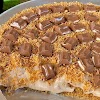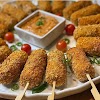For Perfect Food in Ramadan Here are 7 important tips for a healthy fasting
There are many nutritional and health advice related to fasting Ramadan, and some of them come from the nutritionist at the Le Cal Diet Diet Center in Beirut, Lana Fayed Arissi:
1. Coffee:
Fasting should not be broken by drinking a cup of coffee, since eating 'caffeine' on an empty stomach causes an increase in the 'acid' in the stomach and flatulence. On the other hand, the coffee date must be postponed until the next hour for breakfast.
On the other hand, it is allowed to drink a cup of coffee during the Suhoor meal, in order to provide the body with vigor and a feeling of alertness. Note that half of the amount of 'caffeine' consumed remains within the body for three to seven hours. It is worth noting that the headache that affects the fasting person during the day is the result of dehydration to which the body is exposed during the day, and not because of not consuming the 'caffeine' available in coffee and tea.
2. Diet sweets in moderation:
Adjusting the amount of salt, sugar, and fats in the product, makes it label 'Diet' on the package. Therefore, it is the duty of fasting people, especially those with diabetes among them, to exercise caution when seeing the phrase 'sweets diet', while reading its contents and making sure that it is removed from sugar and fat, as it was eaten in moderation. Note that a snack (sweets) should contain between 150 and 200 calories, and it is preferable to be rich in 'protein' and 'calcium'. Healthy Ramadan snack options include yogurt with fruit and oatmeal.
3. Water and juices:
It is advised to drink between one and two and a half liters of water, between breakfast and suhoor, noting that consumption should not exceed one liter within an hour.
As for juices, they may cause weight gain when you drink them too much, especially as they are high in sugar. And recent American studies have shown that a woman loves to content with six teaspoons of juice per day. It is well known that Ramadan drinks are rich in sugar, as a small cup of jujube contains 110 calories (equivalent to two fruits) and 27 grams of sugar. Likewise, liquorice liquor is Ramadan's most sugar-containing beverage, as a small cup of it contains 258 calories (equivalent to 4 grains of fruit) and 60 grams of sugar.
4. Dried fruits:
When fresh water is drawn from fresh fruits, fresh fruits become dried, which means that the latter contain minerals, vitamins and fibers, but they are as useful as they are rich in energy. For example: a grain of dried figs = 37 calories, a medium of dates = 27 calories, and half a cup of raisins = 230 calories.
It is an indication that there are types of dried fruit (such as: mangoes and bananas) that are rich in sugar, and therefore must be legalized in their consumption.
5. Mathematical effort:
Light walking can be practiced before breakfast, and we also lift weights for about half an hour after completing Tarawih prayer.
6. Sleep:
It is known that sleep for less than seven hours at night causes weight gain, given that the body's resistance to 'insulin' increases, as does the hormone 'ghrelin', which stimulates hunger, and reduces the hormone 'leptin', which indicates the brain with a feeling of fullness and stimulate activity metabolism. During fasting, it is advised to take a nap to reduce the effect of cortisol, the hormone responsible for stress levels in the body.
7. Combating bloating and constipation:
Bloating and constipation are among the most common problems among fasters, and the cause of bloating is due to eating quickly, eating fatty or hard-to-digest foods (milk and gluten), or eating a grain of fruit or candy immediately after breakfast. To treat bloating, it is beneficial to eat slowly and avoid beverages containing 'acid' and to drink cardamom tea, cinnamon and mint. Studies have shown that strawberries also help fight bloating.
To combat constipation, you should drink more water and eat foods rich in fiber (oat bread, whole wheat, and vegetables).







 Fashion and style
Fashion and style




0 Comments